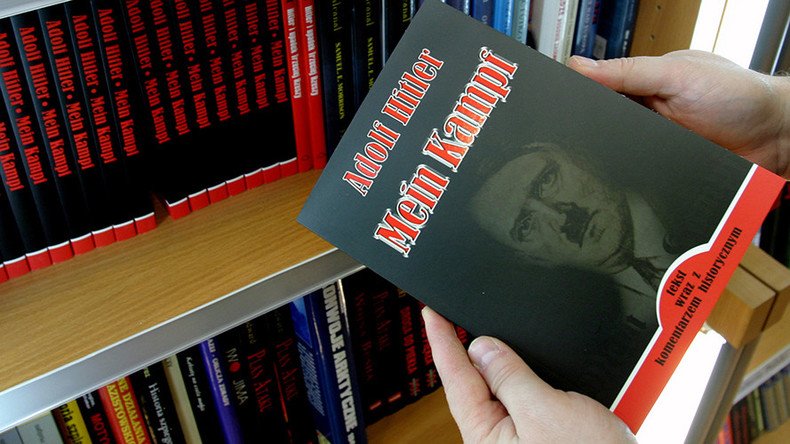Italian school kids name Hitler’s ‘Mein Kampf’ among top 10 books, survey shows

Adolf Hitler’s ‘Mein Kampf’ has made a surprising comeback in Italian schoolchildren’s reading lists, 70 years after the fall of the Nazi regime, with some pupils naming it one of their 10 favorite books in the latest nationwide survey.
The survey was launched by the country’s Ministry for Education in an attempt to promote reading and find out which books schoolchildren prefer.
Despite the fact that only books by Italian authors published after 2000 were up for consideration, young Italians in 10 of the classes surveyed put the Nazi leader’s manifesto among their preferred reads.
Middle school students from Palermo, Catanzaro, Potenza, Tivoli and Gaeta in Lazio, Trieste, Udine and Piacenza all named ‘Mein Kampf’ in their top 10.
Alessandro Fusacchia, the chief of staff of the Ministry of Education and Research, called the news a “particularly nasty case” in his blog entry, as quoted by La Repubblica.
“We are looking into the case,” Fusacchia stated, noting however that the ministry believes the students did not make a mistake or interpret the request wrongly, but rather made a “free choice.”
Fusacchia also noted that teachers, rather than students, had been responsible for submitting the final responses, chosen after a class discussion about reading.
Apart from the shock appearance of ‘Mein Kampf’, the ministry has been pleased with the results of the survey, the enthusiasm of participants and the variety of books that made it to the lists, which Fusacchia called a “great celebration of books and reading.”
Votes were cast for some 10,000 books. Up to 3.5 million students from 138,000 classes submitted their choices between June 1 and December 1. The top three titles chosen by middle school children were ‘Bianca come il latte, rossa come il sangue’ (White as Milk, Red as Blood), a 2013 Italian romantic comedy-drama by Alessandro D'Avenia, ‘Io Non Ho Paura’ (I'm Not Scared), a 2003 coming-of-age Italian crime mystery thriller by Niccolò Ammaniti, and ‘Gomorra’, a 2006 non-fiction investigative book by Roberto Saviano.
Some top 10 entries proved the middle school students are also interested in social issues, for instance many named ‘Nel mare ci sono i coccodrilli’ (There are crocodiles in the sea), a 2011 tale by Fabio Geda that reveals experiences faced by a young Afghan asylum seeker on a journey to Italy, and ‘Mio fratello insegue i dinosauri’ (My brother chases dinosaurs) by Giacomo Mazzariol, a novel about a boy with Down syndrome.
Primary school children were asked to choose their favorite reads without limitations on publication date or the country of origin. Their selection made it clear there’s nothing better than a classic children’s novel: ‘The Little Prince’ by Antoine de Saint-Exupéry came top in almost all 10 regions, while ‘The Adventures of Pinocchio’ by Carlo Collodi and ‘Charlie and the Chocolate Factory’ by Roald Dahl also made the top three.
All schools that took part in the vote will now get €150 (US$158) to buy their books of choice for the school library, with a total of €1.3 million to be spent for the initiative.
‘Mein Kampf’, which translates as ‘My Struggle’, is the part-manifesto, part-memoirs of the Nazi leader Adolf Hitler, outlining his ideology which is the basis for Nazism.
Written in 1924, it expresses Hitler’s anti-Semitic views, which later led to the Holocaust and the slaughter of about 6 million Jews at the hands of the Nazis during World War II.
For the past 70 years, the German state of Bavaria held the copyright it received in 1945, and refused to allow it to be republished. In June this year, however, right-wing Italian newspaper Il Giornale, printed and gave away free copies of the book.
The initiative was widely condemned, but the news outlet justified its actions by noting that all copies included critical notes by an Italian historian and that the move was aimed to teach readers what is evil to avoid its return.
“To learn from the mistakes of the past is our duty. That's why we publish the manifesto of Hitler.”
READ MORE: Germany launches probe into Nazi influence on post-WWII government
“Eighty years ago, we underestimated the problem. We did not read Mein Kampf and overnight we got millions of deaths and a world war. Let's not do it again today,” the newspaper stated.
Italy was under Fascist rule from 1922 until 1945, with Benito Mussolini, who set up a legal dictatorship in the country in 1925, becoming the founder of Italian Fascism.













